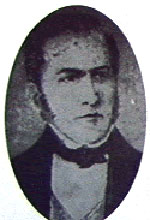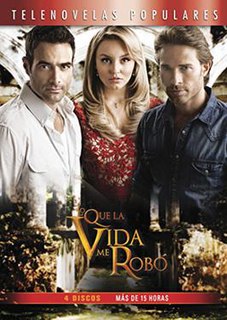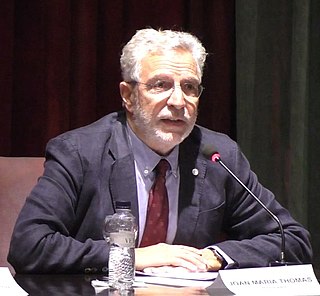Related Research Articles

Tizona is the name of one of the swords carried by Rodrigo Díaz de Vivar, El Cid, according to the Cantar de Mio Cid. The name of the second sword of El Cid is Colada.
Máximo Antonio del Rosario, commonly known as Toño Rosario, is a Dominican singer, songwriter, arranger and Grammy-award nominee musician, best known for his role of bandleader of Merengue music act Los Hermanos Rosario.
The Olimpia Awards are Argentine sports awards given annually by the Círculo de Periodistas Deportivos since 1954. An Olimpia de Plata is awarded to the outstanding performer in 41 sports.

Muchacha italiana viene a casarse is a 1971 Mexican telenovela by Televisa produced by Ernesto Alonso and directed by Alfredo Saldaña, starring Angélica María and Ricardo Blume. Writing credits belong to Delia González Marquez, Fernanda Villeli (adaptation), Marissa Garrido (adaptation), Miguel Sabido (adaptation) and Carlos Lozano Dana (adaptation)
Premio Lo Nuestro 2008 was held on February 21, 2008, at the American Airlines Arena in Miami, Florida. It was broadcast live by Univision Network.
Los Yonic's are a Mexican Grupero band formed in the 1975.

María Elena Marqués Rangel was a Mexican actress and singer who was a star during the Golden Age of Mexican cinema in the 1940s and 1950s.

Manuel José Jimenes González was a military figure and politician in the Dominican Republic. He served as the second President of the Dominican Republic from September 8, 1848 until May 29, 1849. Prior to that he served as the country's Minister of War and Marine Affairs.

La que no podía amar is a Mexican telenovela produced by José Alberto Castro for Televisa. Ximena Suárez wrote the script based on the original story by Delia Fiallo. The cast was headed by Jorge Salinas, José Ron and Ana Brenda Contreras as the main protagonists, While Susana González, Julián Gil, Fabian Robles, Ana Bertha Espín and Mar Contreras as the main antagonists. It is a remake of Delia Fiallo's original radio novela, La Mujer Que No Podia Amar. The previous television versions were Monte Calvario and Te sigo amando. La que no podía amar won 2 awards in Premios TVyNovelas, for Best Lead Actor, and Best Supporting Actor.

Lo que la vida me robó, is a Mexican telenovela produced by Angelli Nesma Medina for Televisa, broadcast by Canal de las Estrellas. The series originally aired from October 28, 2013, to July 27, 2014. It is an adaptation of the 1983 telenovela Bodas de odio produced by Ernesto Alonso, which also inspired Amor real, produced by Carla Estrada in 2003.

El México Que Se Nos Fue is the twenty-second studio album by Juan Gabriel, released in 1995. The album won the Lo Nuestro Award for Regional Mexican Album of the Year.
Duelo de pasiones, is a Mexican telenovela produced by Televisa and originally transmitted by Telesistema Mexicano.
México 1900 is a Mexican telenovela produced by Televisa for Telesistema Mexicano in 1964.

Ana Francis Mor is a Mexican actress, cabaret performer, writer, director and activist. She studied theater at Foro De Teatro Contemporáneo with Ludwik Margules, later taking acting classes with Raul Quintanilla, German cabaret training with Kerny Leopold and Wolfgang Herbert, improvisation with Omar Argentino, stand up comedy and cabaret with Tito Vasconcelos, as well as studying cante jondo with Mogaburo Alfonso Cid and opera with Isaac Bañuelos.

María Luisa Landín was a Mexican singer. She sang bolero, Latin ballad and mariachi styles and was most noted for bolero. She began her career singing as a duo with her sister, but her most memorable works were as a solo singer after their duet broke up. Her 1949 interpretation of "Amor perdido" by Puerto Rican composer Pedro Flores became her signature song, is the second most frequently played song in the history of the Mexican broadcasting and earned her the title "Queen of the Bolero". She recorded over 150 songs with RCA Records between 1939 and 1967, was a featured artist on La Voz Dominicana Television and appeared as a singer in several movies.
What Can Not Be Forgiven is a 1953 Mexican drama film directed by Roberto Rodríguez and starring María Elena Marqués, Armando Calvo and Domingo Soler.

Joan Maria Thomàs Andreu is a Spanish historian. He is professor of Contemporary History at the Rovira i Virgili University and corresponding member of the Royal Academy of History. His academic production has focused on the history of falangism and the international relations of Spain during the Francoist dictatorship.

Vencer el desamor is a Mexican telenovela that premiered on Las Estrellas on 12 October 2020. The series is produced by Rosy Ocampo. The series is part of the "Vencer" franchise, whose first production was Vencer el miedo.
La razón de la culpa is a 1942 film directed by Juan José Ortega who also directed Corazón salvaje. The film stars Blanca de Castejón, Andrés Soler and María Elena Marqués as well as Pedro Infante as Roberto. This was one of Ricardo Montalban's first films.
References
- ↑ "María Elena Marqués". Alma Latina. Archived from the original on 11 January 2014. Retrieved 9 January 2014.